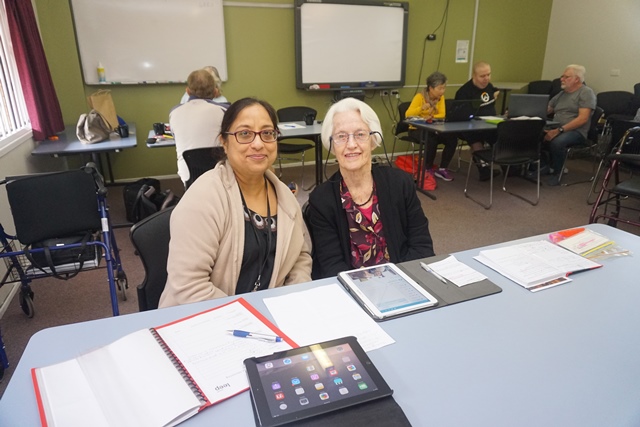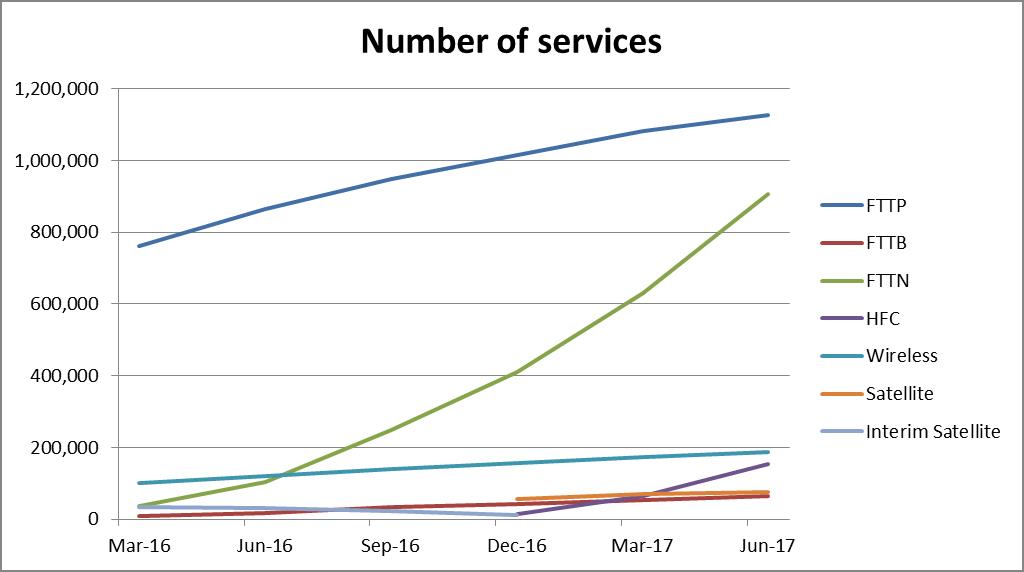Key Dates
Next Grant Round:
Applications for funding will open early 2025.
> Information about our Grants Program
Independent Grants Panel:
Results of the recent EOI will be notified Dec 2024.
> Information about our Panel
We can help: grants@accan.org.au
or phone 02 9288 4000
Subscribe to Grants Program mailings
 Have you noticed how more and more everyday items are now connected to the internet?
Have you noticed how more and more everyday items are now connected to the internet?
While we used to have ordinary watches that told us the time and the date, we now have smartwatches that track our fitness, alert us about emails and more.
We are told that we can expect many things in our homes will be connected, our cars will be connected and we will see even more connected ‘wearable’ devices in the future. These new devices and services raise many questions and concerns for consumers.
Read more: Your place in the connected world
Write comment (0 Comments)NBN Co’s proposed wholesale pricing changes are unlikely to meet the needs of consumers, according to the Australian Communications Consumer Action Network (ACCAN).
In September, NBN Co released a consultation paper to the telco industry that aimed to increase the number of households connected to the NBN. While the proposals outlined in this paper show that NBN Co is listening to ACCAN’s concerns about the current wholesale pricing arrangements, there is still considerable work to be done to ensure that consumers’ needs and expectations of their home broadband service are met.
“While we’re pleased that NBN Co has acknowledged broadband affordability is an important issue for many Australians, we’re concerned their proposals will not address this vital problem,” said ACCAN CEO, Teresa Corbin.
Read more: Urgent need to address broadband affordability: ACCAN
ACCAN recently submitted on the ACMA’s 2023-2028 draft five-year spectrum outlook (the FYSO). The ACMA consults annually on spectrum management priorities for the coming year.
ACCAN’s submission expressed our support for the FYSO’s goals including to:
 The 2017 Australian Digital Inclusion Index showed that overall digital inclusion is growing in Australia.
The 2017 Australian Digital Inclusion Index showed that overall digital inclusion is growing in Australia.
Since 2014, when data was first collected for the Index, Australia’s overall digital inclusion score has improved by 3.8 points, from 52.7 to 56.5.
The Index also found that gaps between digitally included and excluded Australians are “substantial and widening.”
Read more: Helping people Leep into the digital world
Write comment (0 Comments)The increase in complaints about internet services to the Telecommunications Industry Ombudsman (TIO) highlights the need for greater reliability safeguards, says the Australian Communications Consumer Action Network (ACCAN).
The TIO’s quarterly report shows that of the 32,801 complaints they received from 1 July– 30 September 2019, the majority (33 per cent) were related to internet issues. This is a 4 per cent increase from the same period last year.
Read more: Growth of internet issues reinforces need for reliability safeguards
ACCAN recently submitted to the Mobile Network Hardening Program Round 2 – Draft Grant Opportunity Guidelines. In our submission we recommended that the Department of Infrastructure, Transport, Regional Development, Communications and the Arts should:
The ACCAN Annual General Meeting was held in Sydney on Thursday, 21 September, 2017. At the meeting the following three candidates were elected to the Board:
- Deirdre O’Donnell
- Victoria Rubensohn
- Holly Raiche
Congratulations to returning director, Victoria, and a warm welcome back to Holly who re-joins the ACCAN Board after a short break. We also extend a warm welcome to Deidre who joins the ACCAN Board for the first time.
These three new Board members join the six continuing Directors below whose terms conclude at the 2018 and 2019 ACCAN AGM:
Read more: Results of ACCAN Board Election
Write comment (0 Comments)The Australian Media and Communication Authority’s reported drop in telco complaints shows that consumers are starting to benefit from increased industry regulation and new complaint handling rules, according to the Australian Communications Consumer Action Network (ACCAN).
Read more: Telco complaints falling, but serious issues remain
ACCAN recently submitted to Communications Alliance’s consultation on C570:2009 Mobile Number Portability.
ACCAN supports measures to make it easier for consumers to switch between service providers while keeping their phone number. ACCAN considers the current code to be meeting its intended objectives: providing guidance for industry and providing consumer protection. Given the success of the code to date, we suggest a review of the performance levels outlined in the Code in the future as technology allows.
 We’re pleased to announce the successful Grants for 2017-18. This year the projects look at a range of communications consumer issues including the growing spyware marketplace, how consumers can access their online data, the needs of those living in rural, regional and remote communities, and ways telecommunications providers can better engage with people with disability.
We’re pleased to announce the successful Grants for 2017-18. This year the projects look at a range of communications consumer issues including the growing spyware marketplace, how consumers can access their online data, the needs of those living in rural, regional and remote communities, and ways telecommunications providers can better engage with people with disability.
The ACCAN Grants Program funds projects which undertake research on telecommunications issues, represent consumers or create educational tools which empower consumers to derive the greatest benefit from telecommunications products and services.
Read more: Introducing the 2017-18 ACCAN Grants projects
Write comment (1 Comment) The Australian Communications Consumer Action Network (ACCAN) welcomes the Minister for Communications, Cyber Safety and the Arts’ announced changes to the regulation of mobile-porting in Australia’s telco sector.
The Australian Communications Consumer Action Network (ACCAN) welcomes the Minister for Communications, Cyber Safety and the Arts’ announced changes to the regulation of mobile-porting in Australia’s telco sector.
Fraudulent mobile number porting happens when a scammer uses consumers’ personal details to port their mobile number from one provider to another.
ACCAN recently submitted to Communications Alliance’s consultation on C657:2015 Inbound Number Portability.
ACCAN considers the current code to be meeting its intended objectives: providing guidance for industry and providing consumer protection.
 The Australian Communications Consumer Action network (ACCAN) has a strong membership base of disability organisations and individuals with disability. The most consistent feedback we get from these members relates to the lack of available information about telecommunications equipment and services for people with disability. The difficulty of accessing telecommunications for people with disability in Australia has long been recognised as a fundamental contributor to the disability digital divide.
The Australian Communications Consumer Action network (ACCAN) has a strong membership base of disability organisations and individuals with disability. The most consistent feedback we get from these members relates to the lack of available information about telecommunications equipment and services for people with disability. The difficulty of accessing telecommunications for people with disability in Australia has long been recognised as a fundamental contributor to the disability digital divide.
While there is a growing number of new and emerging telecommunication products which can improve access and participation for people with disability, without information about these products and how to access them, people with disability will continue to be left out of our increasingly connected digital society.
Read more: ACCAN’S Disability Mystery Shopping report 2017
Write comment (0 Comments)The fall in complaints to the Telecommunications Industry Ombudsman (TIO) highlights the positive power of effective industry regulation, according to the Australian Communications Consumer Action Network (ACCAN).
Complaints data published today in the TIO’s Annual Report 2018-2019 shows that complaints about phone and internet services fell 21.1 per cent in the last financial year. Among these 132,387 complaints, the TIO identified over 50 possible systemic issues, of which over a third were refer to regulators.
ACCAN recently made a submission to the Australian Bureau of Statistics (ABS) 2026 Census topic consultation. The submission received endorsement from the QUT Digital Media Research Centre (DRMC), the Australian Digital Inclusion Alliance (ADIA), the ARC Centre of Excellence for Automated Decision Making and Society (ADM+S), and the Centre for Inclusive Design (CfID). ACCAN’s submission recommended:
Read more: Australian Bureau of Statistics 2026 Census topic consultation
Every quarter the ACCC releases a report on the services operating over the NBN wholesale network. The report provides some interesting insights into the NBN, here are some that we find useful.
Number of services
The report shows that over 2.5 million premises are connected to the NBN as at June 2017.
Fibre to the Premises (FTTP) is the primary technology used. The number of services over both Fibre to the Node (FTTN) and Hybrid Fibre-Coaxial (HFC) technologies are increasing at a fast rate. The graph below charts the number of services for each quarter by access technology.

Figure 1: Number of services by access technology1
Write comment (0 Comments)A report released today by the nation’s independent infrastructure advisor, Infrastructure Australia, affirms ACCAN’s position that home broadband is unaffordable for many households.
As Australia’s voice for phone and internet users, ACCAN has highlighted the need for more affordable home broadband options for Australian consumers. The 2019 Australian Infrastructure Audit supports this view, describing telecommunications as essential to participating in society, however noting that there are “challenges that must be overcome to ensure that no Australian is left behind in the digital world, in terms of digital literacy, access and affordability.”
Read more: Infrastructure Australia report highlights need to act on telco affordability
ACCAN has provided feedback in response to the ACCC’s Issues Paper on the expanding ecosystems of digital platform service providers. The Issues Paper explores a range of questions related to digital platform ecosystems, Internet of Things (IoT) devices and consumer cloud services in Australia. ACCAN’s submission:
 Getting remote communities connected can be difficult due to the tyranny of distance. Recently we’ve heard some great stories about retail service providers, infrastructure providers and other organisations that are helping to connect Indigenous consumers in some of the most remote parts of Australia. In this article we’ll look at some of the ways this is being achieved.
Getting remote communities connected can be difficult due to the tyranny of distance. Recently we’ve heard some great stories about retail service providers, infrastructure providers and other organisations that are helping to connect Indigenous consumers in some of the most remote parts of Australia. In this article we’ll look at some of the ways this is being achieved.
Satellite broadband provider, Activ8me, is working with the Australian Government to improve access to telecommunications services in remote Indigenous communities.
Read more: Connecting remote Indigenous communities
Write comment (0 Comments)The Australian Communications Consumer Action Network (ACCAN) has called for greater reliability safeguards after data from the ACMA shows unreliable telco services are driving hundreds of thousands of complaints.
In a report released this morning, the ACMA revealed that 448,470 complaints were filed by unhappy telco consumers in the quarter to December 2018. Taking into account the number of telco services in operation across the country, this equals 108 complaints per 10,000 services – a 10.2 per cent increase since the previous quarter.
Read more: Telco complaints demonstrate need for right to reliability
ACCAN has responded to the Federal Government’s thematic review of the Customer Service Guarantee (CSG). The CSG is an important consumer protection as it requires telecommunications service providers to connect and fix landline services within specified time frames.
Read more: Thematic review of the Customer Service Guarantee
 Have you registered for the ACCANect Conference yet? There’s only two weeks left to get your ticket.
Have you registered for the ACCANect Conference yet? There’s only two weeks left to get your ticket.
It’s being held at the Aerial UTS Function Centre in Sydney on Wednesday 20 September – Thursday 21 September, 2017.
Read more: The ACCANect Conference is fast approaching
Write comment (0 Comments)
The revised Telecommunications Consumer Protection (TCP) Code fails to adequately protect telco consumers, according to consumer groups.
Despite consultation with the telco industry and regulator, consumer groups including ACCAN, Consumer Action Law Centre, WEstjustice, Financial Counselling Australia, Financial and Consumer Rights Council, Financial Rights Legal Centre, Money Mob, and HK Training and Consultancy, consider that the new TCP Code does not provide strong enough consumer protections.
ACCAN has responded to the ACCC’s consultation on its Draft Instrument for the Superfast Broadband Access Service (SBAS) Final Access Determination. The SBAS is a declared wholesale access service that retail service providers can use to supply fixed line superfast broadband services to end users.
ACCAN supports the draft instrument which:
Read more: Superfast Broadband Access Service Final Access Determination Draft Instrument
